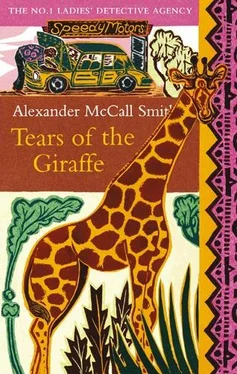And what about her own case? She was a fat lady-traditionally built-and yet she had no difficulty in getting the required amount of sleep. It was all part of this terrible attack on people by those who had nothing better to do than to give advice on all sorts of subjects. These people, who wrote in newspapers and talked on the radio, were full of good ideas as to how to make people better. They poked their noses into other people's affairs, telling them to do this and do that. They looked at what you were eating and told you it was bad for you; then they looked at the way you raised your children and said that was bad too. And to make matters worse, they often said that if you did not heed their warnings, you would die. In this way they made everybody so frightened of them that they felt they had to accept the advice.
There were two main targets, Mma Ramotswe thought. First, there were fat people, who were now getting quite used to a relentless campaign against them; and then there were men. Mma Ramotswe knew that men were far from perfect- that many men were very wicked and selfish and lazy, and that they had, by and large, made rather a bad job of running Africa. Rut that was no reason to treat them badly, as some of these people did. There were plenty of good men about-people like Mr J.L.B. Matekoni, Sir Sereste Khama (First President of Botswana, Statesman, Paramount Chief of the Bangwato), and the late Obed Ramotswe, retired miner, expert judge of cattle, and her much-loved Daddy.
She missed the Daddy, and not a day went by, not one, that she did not think of him. Often when she awoke at this hour of the night, and lay alone in the darkness, she would search her memory to retrieve some recollection of him that had eluded her: some scrap of conversation, some gesture, some shared experience. Each memory was a precious treasure to her, fondly dwelt upon, sacramental in its significance. Obed Ramotswe, who had loved his daughter, and who had saved every rand, every cent, that he made in those cruel mines, and had built up that fine herd of cattle for her sake, had asked for nothing for himself. He did not drink, he did not smoke; he thought only of her and of what would happen to her.
If only she could erase those two awful years spent with Note Mokoti, when she knew that her Daddy had suffered so much, knowing, as he did, that Note would only make her unhappy. When she had returned to him, after Note's departure, and he had seen, even as he had embraced her, the scar of the latest beating, he had said nothing, and had stopped her explanation in its tracks.
"You do not have to tell me about it," he said. "We do not have to talk about it. It is over."
She had wanted to say sorry to him-to say that she should have asked his opinion of Note before she had married him, and listened, but she felt too raw for this and he would not have wanted it.
And she remembered his illness, when his chest had become more and more congested with the disease which killed so many miners, and how she had held his hand at his bedside and how, afterwards, she had gone outside, dazed, wanting to wail, as would be proper, but silent in her grief; and how she had seen a Go-Away bird staring at her from the bough of a tree, and how it had fluttered up, on to a higher branch, and turned round to stare at her again, before flying off; and of a red car that at that moment had passed in the road, with two children in the back, dressed in white dresses, with ribbons in their hair, who had looked at her too, and had waved. And of how the sky looked-heavy with rain, purple clouds stacked high atop one another, and of lightning in the distance, over the Kalahari, linking sky to earth. And of a woman who, not knowing that the world had just ended for her, called out to her from the verandah of the hospital: Come inside, Mma. Do not stand there! There is going to be a storm. Come inside quickly!
NOT FAR away, a small plane on its way to Gaborone flew low over the dam and then, losing height, floated down over the area known as the Village, over the cluster of shops on the Tlokweng Road, and finally, in the last minute of its journey, over the houses that dotted the bush on the airstrip boundary. In one of these, at a window, a girl sat watching. She had been up for an hour or so, as her sleep had been disturbed, and she had decided to get up from her bed and look out of the window. The wheelchair was beside the bed and she was able to manoeuvre herself into it without help. Then, propelling herself over to the open window, she had sat and looked out into the night.
She had heard the plane before she saw its lights. She had wondered what a plane was doing coming in at three in the morning. How could pilots fly at night? How could they tell where they were going in that limitless darkness? What if they took a wrong turn and went out over the Kalahari, where there were no lights to guide them and where it would be like flying within a dark cave?
She watched the plane fly almost directly above the house, and saw the shape of the wings and the cone of brightness which the landing light of the plane projected before it. The noise of the engine was loud now-not just a distant buzz-but a heavy, churning sound. Surely it would wake the household, she thought, but when the plane had dropped down on to the airstrip and the engine faded, the house was still in silence.
The girl looked out. There was a light off in the distance somewhere, maybe at the airstrip itself, but apart from that there was only darkness. The house looked away from the town, not towards it, and beyond the edge of the garden there was only scrub bush, trees and clumps of grass, and thorn bushes, and the odd red mud outcrop of a termite mound.
She felt alone. There were two other sleepers in that house: her younger brother, who never woke up at night, and the kind man who had fixed her wheelchair and who had then taken them in. She was not frightened to be here; she trusted that man to look after them-he was like Mr Jameson, who was the director of the charity that ran the orphan farm. He was a good man, who thought only about the orphans and their needs. At first, she had been unable to understand how there should be people like that. Why did people care for others, who were not even their family? She looked after her brother, but that was her duty.
The housemother had tried to explain it to her one day.
"We must look after other people," she had said. "Other people are our brothers and sisters. If they are unhappy, then we are unhappy. If they are hungry, then we are hungry. You see."
The girl had accepted this. It would be her duty, too, to look after other people. Even if she could never have a child herself, she would look after other children. And she could try to look after this kind man, Mr J.L.B. Matekoni, and make sure that everything in his house was clean and tidy. That would be her job.
There were some people who had mothers to look after them. She was not one of those people, she knew. But why had her mother died? She remembered her only vaguely now. She remembered her death, and the wailing from the other women. She remembered the baby being taken from her arms and put in the ground. She had dug him out, she believed, but was not sure. Perhaps somebody else had done that and had passed the boy on to her. And then she remembered going away and finding herself in a strange place.
Perhaps one day she would find a place where she would stay. That would be good. To know that the place you were in was your own place-where you should be.
CHAPTER THIRTEEN
A PROBLEM IN MORAL PHILOSOPHY
THERE WERE some clients who engaged Mma Ramotswe's sympathies on the first telling of their tale. Others one could not sympathise with because they were motivated by selfishness, or greed, or sometimes self-evident paranoia. But the genuine cases-the cases which made the trade of private detective into a real calling-could break the heart. Mma Ramotswe knew that Mr Letsenyane Badule was one of these.
Читать дальше









